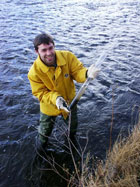Graduate Curricula

Students interested in environmental sciences can satisfy the requirements for a degree in microbiology while pursuing a broadly based program in areas such as biology, chemistry, entomology, plant and soil sciences and plant pathology, and through interaction with the Center for Biofilm Engineering.
Students interested in biomedical sciences can satisfy the requirements for a degree in microbiology and immunology while pursuing a broadly based program in medically related subjects like biology, chemistry and veterinary science, and through interaction with the WWAMI Medical Education Program.

Financial Assistance
Students are encouraged to contact the Department of Microbiology and Cell Biology for information about teaching and research assistantships, and fellowships. Most of our graduate students are supported financially throughout their graduate training. Bothassistantships and fellowships are awarded for one-year periods but are renewable if the graduate student's progress has been satisfactory.
Additional fellowships are available through the Molecular Biosciences Program as well as through IGERT for a handful of qualifying students. Please refer to their websites for application and specific program.
 Research
Research
Faculty and research interests include medical microbiology, environmental microbiology, microbial ecology, microbial physiology, biology of extreme thermal environments, mechanisms of pathogenicity, medical mycology, microbial communities, molecular genetics, geomicrobiology, aquatic microbiology,immunoparasitology, cellular immunology, molecular immunology, and virology and leukocyte and cell molecular biology.
Dissertation, Exam and Defense Information
The Dissertation Committee must consist of at least five (5) faculty members, one being the Doctoral Advisor and one selected by the Graduate School to serve as the Graduate Representative. The remainder of the committee will consist of three faculty members. One may be from an outside department. Only one research/adjunct faculty member may serve on the Dissertation Committee.
Students will write proposals beginning in the spring of the 2nd year. These proposals will outline the research plan and be written in cooperation with the advisor. The format must follow that of the current NIH format for R01 applications. An example of a successful application can be found here: Successful NIH R01 application
The qualifying examination must be completed by October 15th in the fall of the 3rd year and must adhere to the following schedule:
1) The dissertation proposal will be distributed to the committee 2 weeks prior to an initial meeting. Also due at this time are three abstracts that describe potential topics for the mock proposal.
2) At this meeting, the committee will approve the topic and content of the proposal to ensure it is appropriate for PhD-level research. The committee will assign the topic for the mock proposal selected from the three abstracts. Mock proposals should be no more than 7 single-spaced pages, excluding references, and will follow the dissertation proposal format. Mock proposals are due to the committee within 2 weeks following topic approval. These proposals are to be written independently of the advisor or other faculty.
3) One week following the distribution of the mock proposal to the committee, students will present a public seminar on their dissertation work. This will be followed by an oral examination by the committee on subjects covering both dissertation and mock proposals, and general knowledge relevant to the program.
The Graduate Core Committee in cooperation with the advisor and Department Head will determine whether reasons for delay beyond October 15th are acceptable.
Each part of the exam will be evaluated by the committee. Students may pass the exam, fail the exam entirely, or be required to retake one or more components. Repeated examinations must be completed by the end of the fall semester of the 3rd year.
The Dissertation Proposal represents the student’s first attempt at seriously explaining what they propose to do over the next two to four years of their training. The proposal is written in cooperation with the Faculty Advisor.
Before a student completes the Comprehensive Examination, the primary question that the faculty will ask of that student is, “Do you possess the requisite skills, aptitude and knowledge to pursue a Ph.D. research project?” Once a student passes his or her Comprehensive Examination, the faculty are effectively stating that “Yes, this person should advance to candidacy for the degree of Ph.D.”
After passing the Comprehensive Exam, the question is no longer “What does this student know and how do they think?” Rather, the question shifts to “What will this student do to address an original question within the realm of the Molecular Biosciences?” The student will be asked many questions. For example, a student should be prepared to address the following questions about their Dissertation Project:
- What overriding idea will be tested and what specific questions will be asked?
- By what methods and systems will these questions be addressed?
- How will the experimental results allow you to answer these questions?
- What do the answers to your questions tell you about the overriding idea?
- How will the completion of this research change the way scientists look at this area of biology?
Dissertation Committees must be formed by the beginning of the 2nd Fall semester. This must be documented by submitting a signed and completed Program of Study with the Department of Microbiology and Cell Biology front office and the Division of Graduate Education by Sept. 20th of the 2nd Fall semester.
Committee meetings must be held annually. Students must prepare a 1-2 page progress report and provide copies to the Graduate Core Committee. These reports will be kept on file to provide record of the student's progress and any significant changes in direction that may affect typical progression through the program. The Graduate Student Progress Report must be returned to the Graduate Coordinator.
At the annual meeting, the committee will approve (or not approve) that research is nearing conclusion and a defense can be scheduled, if requested by the student. The Defense Approval form must be submitted to the Graduate Coordinator. Defense dates must be submitted to the Graduate Coordinator and to the Department of Microbiology and Cell Biology office.
The above mentioned documents can be found here http://www.montana.edu/gradschool/forms.html
Once the Dissertation Committee agrees that the candidate has completed enough original research to address some of the scientific questions raised in the Dissertation Proposal or in subsequent Committee Meetings, the candidate will schedule a Dissertation Defense, which will consist of a public seminar followed immediately by a Dissertation Committee meeting in which the student must defend the research.
The final Dissertation must be distributed to the Dissertation Committee Members no less than ten days prior to the scheduled examination. The dissertatio must be reviewed and approved by the advisor prior to distribution to the committee.
The following points may be used as guidelines for evaluation:
- Is the research original?
- Are proper experimental designs, techniques and interpretation of results described in the thesis?
- Is the candidate able to defend the methods, findings and conclusions of the research?
- Is the candidate sufficiently knowledgeable of the literature to place the contribution in proper context?
- Are the results of the research published or worthy of publication?
Other Faculty Expectations
- Annual Student Seminars - Each Graduate Student is Required to present a Seminar as part of the Curriculum.
- Teaching Assistant to Undergraduate Course offered by the Department of Microbiology and Cell Biology
- Advice to Graduate Students
